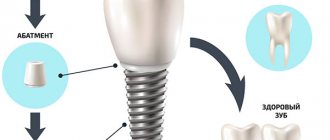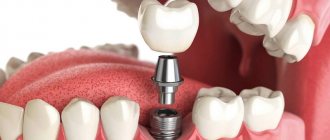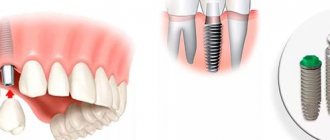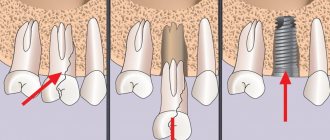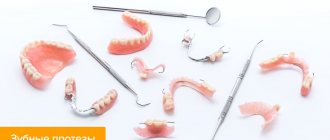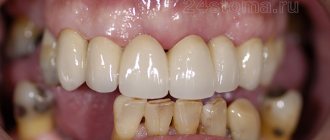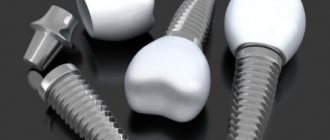Dental implantation is a modern method of restoring lost teeth, restoring chewing comfort, normal diction and an attractive smile. Its essence lies in the implantation of an artificial metal root into the jawbone, on which a crown is installed, indistinguishable in shape, appearance and function from natural teeth. But, as in all other cases, the advantages of this method have their downside.
Some people who study the issue before making a decision about which type of prosthetics to give preference suspect that something is being hidden from them, so everywhere they write only about the advantages of implantation, and about the disadvantages - briefly and indistinctly. We will try to honestly and objectively understand the pros and cons of dental implantation with you.
Honestly about the disadvantages of implantation
Despite the significant advantages - restoration of the chewing load on the bone and stopping the atrophy of bone tissue, the feeling of the implant as if it were your own teeth, excellent appearance, durability and reliability, no need to grind down adjacent teeth - implantation also has its own disadvantages, which we will consider in detail.
1. Pain after implantation. Installation of an implant (or implant - everyone pronounces a foreign word differently) is a surgical operation with all the ensuing consequences - including pain for some time after the operation. During the normal course of the process, the pain goes away within a few (3-5) days.
2. Possible complications. One of the most serious complications is material rejection - the body does not perceive a foreign object and tries to get rid of it. Inflammation, pain, swelling, implant mobility, fluid secretion and even increased body temperature. To be fair, let’s say that the probability of such an outcome is very low - it is only 2-3% of the total number of people who have implants installed.
3. Presence of contraindications. Implantation, like most all medical procedures, has contraindications – situations in which it is impossible to install implants. These include: age under 20 years, diabetes mellitus (type 2), hepatitis, AIDS, other immune and cardiovascular diseases, bleeding disorders, bruxism and some others. Some of the contraindications can be circumvented, others cannot.
4. Long installation process. The installation itself can be carried out in literally 1-2 visits to the dentist, but the total period of engraftment of the artificial root can take from 6 months to 1-2 years. But in case of a favorable outcome (and this, we remind you, is 97-98% of all cases), you will have the same tooth as before, which will serve you without any problems for 10-20 years, or even more.
5. Caring for implants is more complicated than regular teeth, although not by much. They need to be cleaned more thoroughly, and you also need to regularly visit a dentist, who should monitor the condition of the implant and take timely measures if any problems suddenly arise.
6. The cost of implantation is very high. Prices for installing one implant start from 18,000 rubles - and this does not include the cost of the crown. In other clinics (especially in the capital), the total cost of a new tooth can exceed 100,000 rubles or more.
Still, the pros outweigh the cons in most cases. Otherwise, implantation would not be used so widely, and this technology, for a moment, is already more than 55 years old. The first operation was successfully performed by the developer of this technology and the founder of Nobel Biocare (which is still a leader in the scientific development and production of implants) Per-Ingvar Brånemark back in 1965.
Since then, millions of operations have been performed all over the world, several more large companies have appeared producing implants, instruments and components, implants of a more advanced form and from the latest, biocompatible materials have been proposed, the technology has been developed to perfection, and research into the consequences of implantation has become the most extensive nature, including many thousands of patients observed over decades. But still, let’s return to the disadvantages of implantation and analyze them more carefully.
Price of dental implants and classic dentures: comparison
20,000 rub. the minimum cost of installing an implant. The maximum cost may vary, from 50,000 rubles. and higher. The cost of an abutment starts from 4,000 rubles. The price is determined in accordance with the manufacturer. The cost of a crown also differs, depending on the material from which it is made. If it is made of metal ceramics, then the price starts from 15,000 rubles, and if it is made of zirconium oxide, then from 25,000 rubles. When a patient requires a sinus lift, its price ranges from 11,000-30,000 rubles, sometimes higher. Conclusion: 40,000 rub. Turnkey implantation costs along with a crown. Compared to implantation, installation of clasp and bridge prostheses costs approximately the same. Additionally, they involve grinding of teeth. We must not forget about the need to replace the structure in the future. Approximately 36,000 rubles. installation of a removable denture costs. But the structure will have to be reinstalled annually.
The choice in favor of one or another method of dental restoration is up to you. We hope the above facts will help you with this.
Pain after dental implantation
The first disadvantage that scares many is the pain after installing the implant. It appears immediately after the anesthesia wears off and lasts for several days. It is caused by the fact that the surgical implantation procedure involves some damage to soft tissue and bone, which must subsequently regenerate, as well as the placement of a metal pin - an artificial root - into the jaw, which must take root.
In the vast majority of cases, the damage heals within three to five days, and the pain after dental implantation, which is dull, aching, and not very pronounced, gradually stops. These unpleasant sensations are comparable to pain after tooth extraction and disappear completely within a week after surgery.
If the pain is severe, has a cutting, pressing or jerking nature, is poorly eliminated by analgesics and does not go away within 3-5 (maximum 7) days after surgery - this may be a sign of the onset of a pathological process and almost always (with very rare exceptions) indicates about mistakes made during implantation.
Causes of pain after implantation
The most common reason for the development of pathology is the penetration of infection into the wound during or after surgery - for example, when using insufficiently sterile instruments or materials, the penetration of pathogenic bacteria through the edges of a loosely sutured wound, or when the sutures come apart. In some cases, with insufficiently qualified implantation, damage to the nerve structures of neighboring tissues occurs, which causes intense aching pain, which is practically uncontrollable by analgesics.
Another possible cause is the formation of a blood clot between the implant and the gum tissue, resulting from a damaged blood vessel or a bleeding disorder in the patient. Normally, after surgery, the patient experiences a subtle aching pain that goes away within 3 days, as well as slight bleeding, swelling and swelling at the operation site.
All this is a consequence of surgery and the reaction of the body’s immune system to it and goes away in 3-5 days. If the pain is severe, acute, there is severe swelling of the gums, fluid is released from under the installed structure, and all this continues for more than 5 days - this is a signal that you need to seek help from a doctor.
How to reduce pain after implantation?
It is necessary to understand that after surgery the body needs time and energy to recover, so it is important to carefully listen to the doctor’s recommendations and strictly follow them - refuse solid food during recovery, chew on the other side of the jaw, do not drink alcohol or smoke, do not go to the sauna and a sauna in the first month after implantation.
You must brush your teeth carefully, using a soft-bristled brush, try not to injure the tissues of the oral cavity, avoid physical impacts (impacts, shocks), observe good hygiene, promptly use medications (including antibacterials) prescribed by your doctor, and do not take other medications. without consulting a doctor.
To reduce pain, you can use cold lotions (with ice) in the first hours after implantation. They are used no longer than 20-30 minutes to avoid tissue hypothermia.
Regularly (especially after eating) rinse your mouth with water and antiseptic solutions (for example, chlorhexidine-based).
Healing gels (such as Metrogyl Denta) or cotton swabs moistened with an antiseptic solution (chlorhexidine) can be applied to the area of the gums where the sutures are located.
You can use analgesics (ketanov, paracetamol, ibuprofen, nimesil), observing dosages and intervals between doses. Their effectiveness is enhanced by drinking plenty of fluids.
Among folk remedies, it is allowed to use a decoction of chamomile, eucalyptus, calendula, plantain, as well as a pulp of fresh aloe leaf. You can rinse your mouth with decoctions (or tincture diluted in water) or moisten cotton swabs and apply to the sore spot.
Attention! Any means are used only as prescribed by a doctor or in agreement with him! Carefully follow the requirements and recommendations of the implantologist and do not self-medicate. And if the pain is too severe, consult a doctor.
Free dental consultation
Our clinic offers a free examination by a dentist or implantologist. The doctor will examine the oral cavity and give recommendations for treatment and dental prosthetics.
You can read all the nuances of implantation in the article.
To find out more about prices for treatment and installation of implants, go to the appropriate section of our website. Registration for a consultation is carried out by phone and 7(920)-090-49-94, in the feedback form and during a personal visit to the clinic.
You can also find more information about installing implants in the article.
Complications during dental implantation
Implantation is a well-developed procedure over decades, studied in every detail, studied not only in the short-term consequences, but also in the long term. Therefore, with proper treatment planning and compliance with the entire dental implantation protocol, complications occur extremely rarely.
In most cases of complications or material rejection, the cause is violations of the surgical technology or a doctor’s error associated with a lack of experience, leading to the wrong choice of tools and equipment, violation of the rules of compliance with aseptic and antiseptic requirements, errors in preparatory procedures, implantation with insufficient bone tissue, injuries during surgery.
On the other hand, an error or negligence may be made by the patient, and complications may arise for this reason. For example, violation of restrictions on food intake (excessively hard or traumatic), alcohol consumption, physical exposure, failure to comply with hygiene or the requirements of antibacterial therapy, taking medications that reduce the effectiveness of treatment, etc.
Some complications may occur immediately after surgery, while others may occur after some time. Postoperative complications may include severe bleeding, sinusitis, or damage to the facial nerves.
If the patient has hypertension or cardiac pathology associated with rhythm disturbances (tachycardia), heavy bleeding may develop. Damage to the maxillary sinus due to unsuccessful implantation in the upper jaw can cause an inflammatory disease - sinusitis.
Due to direct damage, or pressure from the hematoma on nearby nerves, a disturbance in the transmission of nerve impulses may develop, a sign of which may be pain or persistent numbness of part of the jaw. More long-term consequences of implantation are peri-implantitis and rejection of the installed structure.
Peri-implantitis is an inflammation of the tissue around the implant, usually caused by an infection that entered the wound either with unsterile instruments, the material itself, particles of saliva during the operation, or later, through poorly placed or broken sutures. Other reasons may be the patient's failure to maintain proper hygiene or food intake after implantation, a violation of the treatment regimen, or injury.
With the development of inflammatory processes around the artificial root, new bone tissue and soft tissue around the implant cannot form (or are destroyed). The process is accompanied by pain, swelling, unpleasant putrid odor from the mouth, discharge of pus, as well as mobility of the installed implant, and even an increase in body temperature. This condition leads to the loss of an artificial structure - a tooth or denture.
This can happen a year after implantation. And if such signs appear, you should immediately consult a doctor. Treatment in these cases is always individual - it completely depends on the cause of the complications and the clinical picture. In some cases, it is necessary to remove the implant and install a new one in its place, in others, it is necessary to use other methods of prosthetics.
As already mentioned, the risk of such complications is extremely small - at the level of 2-3%. It can be minimized by choosing a qualified, experienced doctor who does not make mistakes, as well as by strict adherence to all his recommendations by the patient.
Questions and answers
Is it painful to have implants installed?
Implantation is a full-fledged operation. It is performed under local anesthesia or general sedation. The choice of drug and method of administration is the prerogative of the doctor. After the operation, the dentist will prescribe adequate pain relief.
Is there a difference in installation between the upper and lower jaw?
Yes, the roots of the teeth of the upper jaw abut or enter the upper maxillary sinus. Before implantation, an operation is required to lift the bottom of the sinus and build up bone tissue. In addition, in some cases, zygomatic implants are used. Bone augmentation to install a pin in the lower jaw may not be performed. This depends on the results of the patient's examination.
At what age are implants placed?
From 18 years and older. Old age is not a reason for refusing to install a dental structure. The procedure is allowed at both 70 and 80 years of age.
Is it possible to do an MRI after implantation?
Dental implantation is not a contraindication for either MRI or CT. The dental structure is made of titanium alloy. During the procedure, it will not heat up, will not move, and will not cause pain.
Contraindications to dental implantation
Unfortunately, it is not always possible to install implants. Contraindications to dental implantation include relative and absolute.
Absolute conditions include the presence of serious chronic diseases:
- diabetes mellitus,
- severe liver and kidney diseases,
- oncology,
- tuberculosis (in open form),
- immune diseases,
- cardiovascular,
- nervous diseases.
In addition, contraindications include childhood, allergic reactions to anesthetics, diseases that impair blood clotting, and bruxism (teeth grinding).
Relative (or temporary) contraindications include:
- pregnancy and breastfeeding,
- caries, inflammatory diseases of the oral cavity,
- malocclusion,
- smoking, alcoholism and drug addiction,
- infectious diseases,
- taking immunosuppressants.
At the same time, it should be noted that many diseases in remission allow implantation to be carried out by choosing the right technology and medications.
Technology advantage
- The technique allows you to solve the problem of the absence of a dental unit in the shortest possible time.
- The number of seams is minimal.
- No bone grafting is required.
- In one session, 1 damaged tooth is replaced with a strong new one. The bite does not change.
- Minimal recovery period.
For more reliable implantation of the structure, it is not recommended to load the crown on the day of the session. Speed, lack of discomfort, and the possibility of performing the procedure without bone grafting are the main advantages of one-step dental implantation. The service life of the implant is at least 20 years.
Pros of dental implantation
As we have already said, implantation has not only disadvantages, but also very significant advantages. In many cases, they outweigh the disadvantages of dental implants; in addition, there are situations when implantation is the only way out - for example, when a denture causes a gag reflex, or in the case of the loss of all teeth, when there is no other support for the orthopedic structure.
Aesthetics
This is the first most important advantage: artificial teeth on implants cannot be distinguished from natural ones by their appearance, while dentures are often noticeable to a careful eye.
Naturalness of sensations
After implantation, artificial teeth are no different from your own - you don’t even need to get used to them, because... they completely reproduce the shape and function of natural teeth. It will take much longer to get used to dentures, and some people cannot get used to them completely.
Natural gum contour
The gum former restores its original shape and subsequently the gum contour completely coincides with the natural one, in contrast to prostheses, which constantly act on the gum, changing its shape.
Stopping bone atrophy
When a tooth is lost, the chewing load that it exerted on the jaw bone disappears, and this entails atrophy (resorption) of the bone tissue, which sooner or later will affect the neighboring teeth, leading to their displacement and loosening. The implant transfers normal load to the bone, just like a regular tooth, so atrophy does not occur and the neighboring teeth are not in danger.
Hassle-free power supply
Dietary restrictions are set only for the period immediately after implantation - until the artificial root takes root completely. After this, the implants are no different in their functions from natural ones, so they can chew any food, even hard ones. The implants will not suffer from this and will not fall out like dentures.
Preservation of adjacent teeth
A typical case of prosthetics is the grinding of adjacent teeth on which the prosthesis rests. This leads to their gradual wear and subsequent loss. The implant does not require treatment of adjacent teeth and allows you to save them completely.
Durability
All leading manufacturers provide a lifetime warranty on their implants. This means they will last for many years. Only the crown will need to be replaced approximately once every 10 years as it wears out. The implant itself will last for the rest of your life. And if something happens to it, the manufacturer provides a free replacement.
Full functionality
It is not always possible to fit dentures well so that they do not spoil diction or interfere with chewing food. There is no such problem with implants. They fully reproduce aesthetics, diction, and chewing function without any restrictions. And in case of complete loss of teeth, a denture on implants is the only alternative to constantly falling out false jaws.
Prevention
By preventing bone tissue atrophy and preventing the displacement and loosening of neighboring teeth, implants prevent the development of damage to their roots - periodontal disease.
We looked at the pros and cons of dental implants in general and, as we see, in some cases there is simply no alternative to installing implants. At the same time, the most important thing for the patient is not to choose certain models or manufacturers, but to choose a good doctor. Because implants from all leading manufacturers provide the same highest level of quality, but doctors have different abilities and experience.
At the Dental Master clinic you will find an experienced team of doctors with extensive knowledge and qualifications to carry out any type of implantation. An implantologist will select the most suitable material for your case, plan all stages of treatment, carry out the necessary diagnostics and install implants, with which you will not have any problems.
What is cheaper: an implant or a prosthesis?
In addition to the implant itself, the cost of placing an implant also includes the cost of surgery, anesthesia, postoperative manipulations and examinations. In each specific case, the implant surgeon makes an individual cost calculation at a consultation appointment. The crown for the implant can be made of different materials: metal-ceramics, metal-free ceramics, zirconium dioxide - the cost is also calculated based on the clinical situation and the wishes of the patient. Bone grafting can make the procedure more expensive; the need for it is assessed based on the results of 3D diagnostics of the maxillofacial area. Clasp dentures and bridges will not cost much more if additional preparation of supporting teeth is required, and do not forget about the costs of their regular replacement. A removable denture for both jaws is cheaper, but the patient will have to change it annually.
